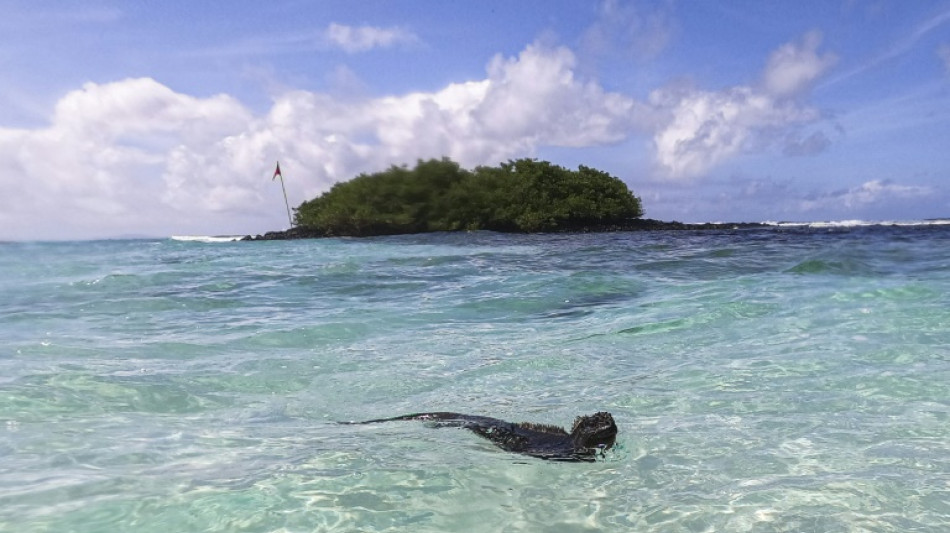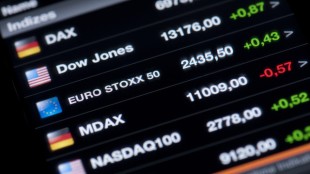
-
 Thailand's pilot PM lands runaway election win
Thailand's pilot PM lands runaway election win
-
Sarr strikes as Palace end winless run at Brighton

-
 Olympic star Ledecka says athletes ignored in debate over future of snowboard event
Olympic star Ledecka says athletes ignored in debate over future of snowboard event
-
Auger-Aliassime retains Montpellier Open crown

-
 Lindsey Vonn, skiing's iron lady whose Olympic dream ended in tears
Lindsey Vonn, skiing's iron lady whose Olympic dream ended in tears
-
Conservative Thai PM claims election victory

-
 Kamindu fireworks rescue Sri Lanka to 163-6 against Ireland
Kamindu fireworks rescue Sri Lanka to 163-6 against Ireland
-
UK PM's top aide quits in scandal over Mandelson links to Epstein

-
 Reed continues Gulf romp with victory in Qatar
Reed continues Gulf romp with victory in Qatar
-
Conservative Thai PM heading for election victory: projections

-
 Heartache for Olympic downhill champion Johnson after Vonn's crash
Heartache for Olympic downhill champion Johnson after Vonn's crash
-
Takaichi on course for landslide win in Japan election

-
 Wales coach Tandy will avoid 'knee-jerk' reaction to crushing England loss
Wales coach Tandy will avoid 'knee-jerk' reaction to crushing England loss
-
Sanae Takaichi, Japan's triumphant first woman PM

-
 England avoid seismic shock by beating Nepal in last-ball thriller
England avoid seismic shock by beating Nepal in last-ball thriller
-
Karl defends Olympic men's parallel giant slalom crown

-
 Colour and caution as banned kite-flying festival returns to Pakistan
Colour and caution as banned kite-flying festival returns to Pakistan
-
England cling on to beat Nepal in last-ball thriller

-
 UK foreign office to review pay-off to Epstein-linked US envoy
UK foreign office to review pay-off to Epstein-linked US envoy
-
England's Arundell eager to learn from Springbok star Kolbe

-
 Czech snowboard great Ledecka fails in bid for third straight Olympic gold
Czech snowboard great Ledecka fails in bid for third straight Olympic gold
-
Expectation, then stunned silence as Vonn crashes out of Olympics

-
 Storm-battered Portugal votes in presidential election run-off
Storm-battered Portugal votes in presidential election run-off
-
Breezy Johnson wins Olympic downhill gold, Vonn crashes out

-
 Vonn's Olympic dream cut short by downhill crash
Vonn's Olympic dream cut short by downhill crash
-
French police arrest five over crypto-linked magistrate kidnapping

-
 Late Jacks flurry propels England to 184-7 against Nepal
Late Jacks flurry propels England to 184-7 against Nepal
-
Vonn crashes out of Winter Olympics, ending medal dream

-
 All-new Ioniq 3 coming in 2026
All-new Ioniq 3 coming in 2026
-
New Twingo e-tech is at the starting line

-
 New Ypsilon and Ypsilon hf
New Ypsilon and Ypsilon hf
-
The Cupra Raval will be launched in 2026

-
 New id.Polo comes electric
New id.Polo comes electric
-
Iran defies US threats to insist on right to enrich uranium

-
 Seifert powers New Zealand to their record T20 World Cup chase
Seifert powers New Zealand to their record T20 World Cup chase
-
Naib's fifty lifts Afghanistan to 182-6 against New Zealand

-
 Paul Thomas Anderson wins top director prize for 'One Battle After Another'
Paul Thomas Anderson wins top director prize for 'One Battle After Another'
-
De Beers sale drags in diamond doldrums

-
 NFL embraces fashion as league seeks new audiences
NFL embraces fashion as league seeks new audiences
-
What's at stake for Indian agriculture in Trump's trade deal?

-
 Real Madrid can wait - Siraj's dream night after late T20 call-up
Real Madrid can wait - Siraj's dream night after late T20 call-up
-
Castle's monster night fuels Spurs, Rockets rally to beat Thunder

-
 Japan votes in snow-hit snap polls as Takaichi eyes strong mandate
Japan votes in snow-hit snap polls as Takaichi eyes strong mandate
-
Pakistan's capital picks concrete over trees, angering residents

-
 Berlin's crumbling 'Russian houses' trapped in bureaucratic limbo
Berlin's crumbling 'Russian houses' trapped in bureaucratic limbo
-
Neglected killer: kala-azar disease surges in Kenya

-
 Super Bowl set for Patriots-Seahawks showdown as politics swirl
Super Bowl set for Patriots-Seahawks showdown as politics swirl
-
Sengun shines as Rockets rally to beat NBA champion Thunder

-
 Matsuyama grabs PGA Phoenix Open lead with Hisatsune one back
Matsuyama grabs PGA Phoenix Open lead with Hisatsune one back
-
How Dental Implants Can Improve Your Quality of Life in Bonita Springs


Adapt now as hotter marine heatwaves hit: scientists
Conservationists and the fishing and tourism industries must take pre-emptive measures to protect wildlife and livelihoods as the El Nino phenomenon amplifies marine heatwaves already made more intense and frequent by climate change, scientists said on Wednesday.
The naturally occurring weather pattern originates in the Pacific Ocean and drives increased heat worldwide, bringing drought to some areas and heavy rains elsewhere.
The central and eastern Pacific, parts of the western United States, Ecuador, Peru and the Indian Ocean are most likely to be hit hardest by longer and intensified heatwaves.
Historical data show these regions to be vulnerable to mass die-offs of marine habitats including coral reefs and kelp forests, nine experts wrote in a comment in the journal Nature.
Preparing for the heatwaves in the months ahead would stave off or soften their consequences, buying precious time for species, ecosystems and connected industries to adapt, they said.
The extreme events "show us what the long-term future might be like under climate change, when these warm ocean temperatures will be experienced every day", said report co-author Alistair Hobday.
"A combination of climate warming and extreme events will make life difficult for species that are already living close to their maximum tolerance," like corals, he told AFP.
Authorities should set up warning systems so local communities can act, for instance, by relocating fish species to cooler waters, reducing harvest quotas, or closing fishing areas altogether, the scientists noted.
These can range from ocean weather forecasts reliable a week in advance to long-term climate projections that take into account manmade greenhouse gas emissions.
Improved forecasting that uses models combining ocean and atmospheric models, and assessing the accuracy of their predictions, is "crucial" for local biodiversity conservation, the experts said.
Indigenous and local communities should lead intensified monitoring and planning efforts as they are well placed to notice early changes in the environment, they added.
- 'Permanent heatwave state' -
Marine heatwaves disrupt ecosystems, killing some species and forcing others to migrate to cooler waters.
The climate crisis could create a "permanent heatwave state", meaning species and ecosystems can no longer survive in some regions, the authors wrote.
Catches can be reduced for several years, as happened in the crab and scallop fisheries off western Australia after a 2011 warming event.
Species migration can also affect fish market prices, employment and quota management.
Snorkelling and diving firms could reduce staff numbers during marine heatwaves or change their activities to minimise job losses, the researchers suggested.
Adapting to climate change has taken on a greater role in public policy in addition to mitigating its effects.
At climate negotiations in Egypt last year, UN chief Antonio Guterres unveiled a five-year plan costing $3.1 billion to build a global early warning system for deadly and costly extreme weather events amplified by climate change.
El Nino events, which occur every two to seven years, are marked by warmer-than-average sea surface temperatures in the central and eastern Pacific near the Equator, and last about nine to 12 months.
This year has already seen unprecedented marine heatwaves, with record-high temperatures measured in the Mediterranean, the North Atlantic and off Florida.
The current El Nino "could be as strong" as the previous one recorded in 2015-2016 but is developing more slowly, Hobday said.
D.Cunningha--AMWN


